Tom's Hardware Verdict
Adata’s swordfish isn’t the most responsive SSD out there, but it looks great and comes with AES 256-bit encryption support at a very low price.
Pros
- +
Low cost
- +
Large SLC write cache
- +
Sleek aesthetic
- +
AES 256-bit encryption
- +
5-year warranty
- +
SSD Toolbox and cloning software
Cons
- -
Slow write performance after the SLC cache fills
- -
Endurance is lower than average
- -
Could use further power optimization
Why you can trust Tom's Hardware
Adata’s Swordfish is an entry-level NVMe SSD built for creatives and gamers looking for faster-than-SATA performance, without spending a whole lot. Powered by Realtek’s entry-level NVMe SSD controller, it offers up sequential performance of up to 1.8 GBps and comes with support for AES 256-bit encryption. With a stylish silver heatsink and black PCB, it’s quite the looker too. It’s just not the most responsive SSD out there, due to its lack of DRAM.
It’s not often that we see a low-cost M.2 NVMe SSD that supports AES 256-bit encryption, let alone one with a DRAMless architecture, but Adata’s Swordfish is just that. With Realtek’s RTS5763DL NVMe SSD controller, it not only sports this optional security support to keep your data secure, but it also hits the market at very low prices, as low as $0.10 per GB. Although the DRAMless architecture holds it back in terms of responsiveness and endurance rating, the Swordfish is still quite appealing for those looking to save a few bucks on a boot or game drive.
Specifications
| Product | Swordfish 250GB | Swordfish 500GB | Swordfish 1TB | Swordfish 2TB |
|---|---|---|---|---|
| Pricing | $37.99 | $54.99 | $99.99 | $209.99 |
| Capacity (User / Raw) | 250GB / 256GB | 500GB / 512GB | 1000GB / 1024GB | 2000GB / 2048GB |
| Form Factor | M.2 2280 | M.2 2280 | M.2 2280 | M.2 2280 |
| Interface / Protocol | PCIe 3.0 x4 / NVMe 1.3 | PCIe 3.0 x4 / NVMe 1.3 | PCIe 3.0 x4 / NVMe 1.3 | PCIe 3.0 x4 / NVMe 1.3 |
| Controller | Realtek RTS5763DL | Realtek RTS5763DL | Realtek RTS5763DL | Realtek RTS5763DL |
| DRAM | DRAMless - HMB | DRAMless - HMB | DRAMless - HMB | DRAMless - HMB |
| Memory | SanDisk BiCS4 96L TLC | SanDisk BiCS4 96L TLC | SanDisk BiCS4 96L TLC | SanDisk BiCS4 96L TLC |
| Sequential Read | 1,800 MBps | 1,800 MBps | 1,800 MBps | 1,800 MBps |
| Sequential Write | 900 MBps | 1,400 MBps | 1,400 MBps | 1,400 MBps |
| Random Read | 130,000 IOPS | 160,000 IOPS | 180,000 IOPS | 180,000 IOPS |
| Random Write | 100,000 IOPS | 100,000 IOPS | 180,000 IOPS | 180,000 IOPS |
| Security | AES 256-bit Encryption | AES 256-bit Encryption | AES 256-bit Encryption | AES 256-bit Encryption |
| Endurance (TBW) | 120 TB | 240 TB | 480 TB | 960 TB |
| Part Number | ASWORDFISH-250G-C | ASWORDFISH-500G-C | ASWORDFISH-1T-C | ASWORDFISH-2T-C |
| Warranty | 5-Years | 5-Years | 5-Years | 5-Years |
Features
The Swordfish is available in capacities of 250GB up to 2TB and is priced very competitively, especially with the 1TB capacity listed at just $99.99. With a PCIe 3.0 x4 interface,Adata rates the Swordfish to deliver sequential performance figures of up to 1.8/1.4 GBps read/write for all models over 500GB; the 250GB capacity takes a performance hit, only rated to write up to 900MBps. And, in terms of random performance, the Swordfish can sustain upwards of 180,000/180,000 random read/write IOPS.
As it is with many SSD’s, these ratings are burst rates. Sustained performance is usually a bit lower, degrading a bit under heavy workloads. Adata’s Swordfish comes with a dynamic SLC write cache that spans one-third of the available capacity to ensure responsive write performance under most use cases before degrading in speed. At 1TB, our sample’s cache should measure roughly 333GB when empty and scales down as it is filled with data. Check the performance section to see how that played out in testing.
Leveraging LDPC (Low-Density Parity-Check) error-correcting code and with 9% of the flash set aside for over-provisioning, Adata’s Swordfish is rated to deliver up to 960 TB of write endurance at the largest capacity. Given its lack of DRAM and low cost, these lower-than-average figures are expected. Fortunately, the length of the warranty generally matters more than the actual endurance ratings. And with a five-year warranty, the drive is generously covered on that front.
The Swordfish supports Trim, S.M.A.R.T. data reporting, and support for lower power active and idle modes. We were quickly able to secure erase the SSD with our motherboard’s built-in SSD secure erase tool, too. But the Swordfish’s feature support doesn’t stop there. The company outfitted the drive with hardware-accelerated AES 256-bit encryption support. So, not only will it load up your data quickly, it will do so only for you if securely configured.
Software and Accessories
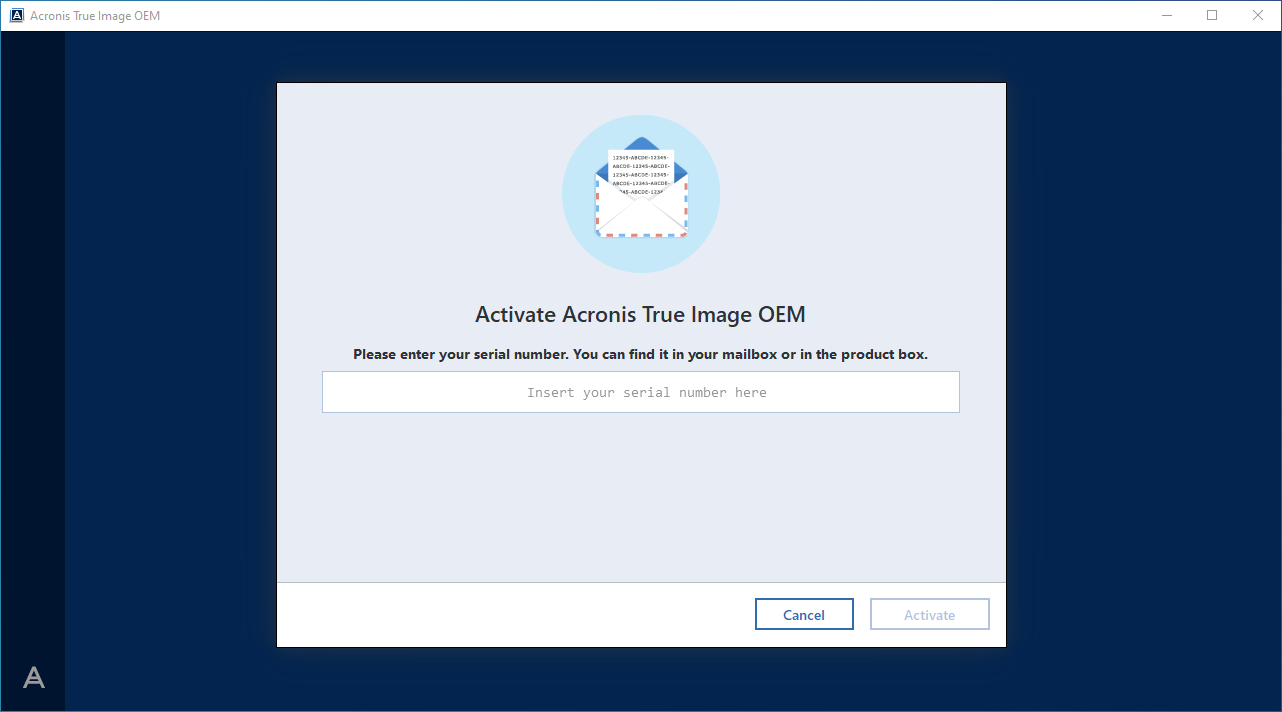
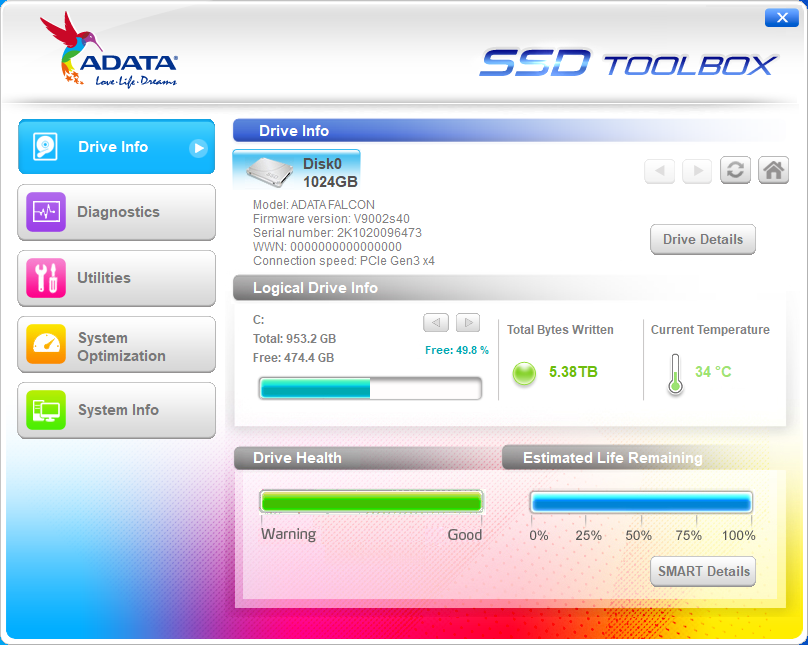
Adata provides buyers with an SSD Toolbox download and data migration utility to use. The toolbox is rather basic but can update the SSDs firmware and run some diagnostic tools. The cloning software is provided by Acronis True Image; it’s a free-to-use OEM version that allows you to migrate your old data to your new Adata SSD.
Get Tom's Hardware's best news and in-depth reviews, straight to your inbox.
A Closer Look
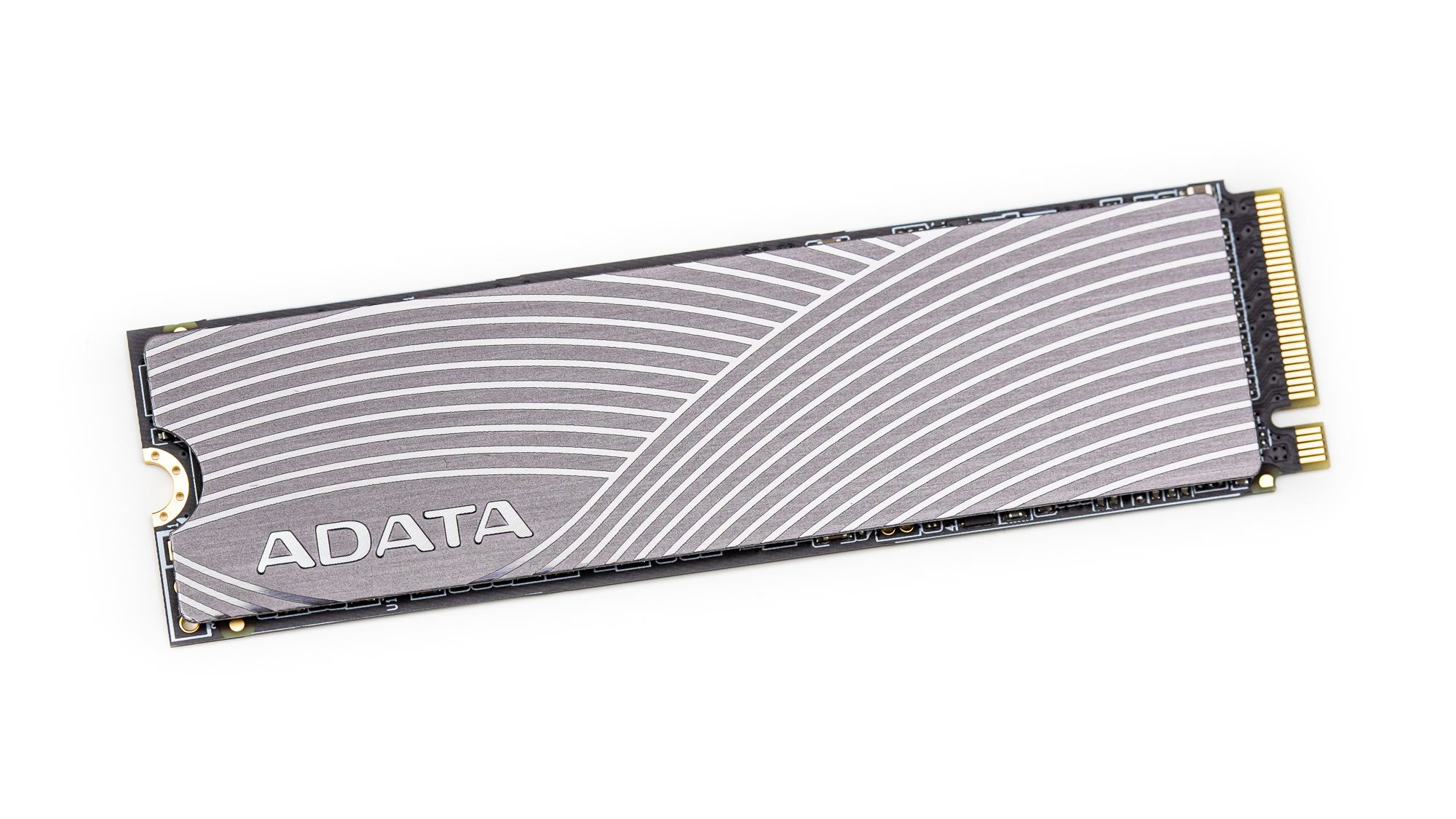
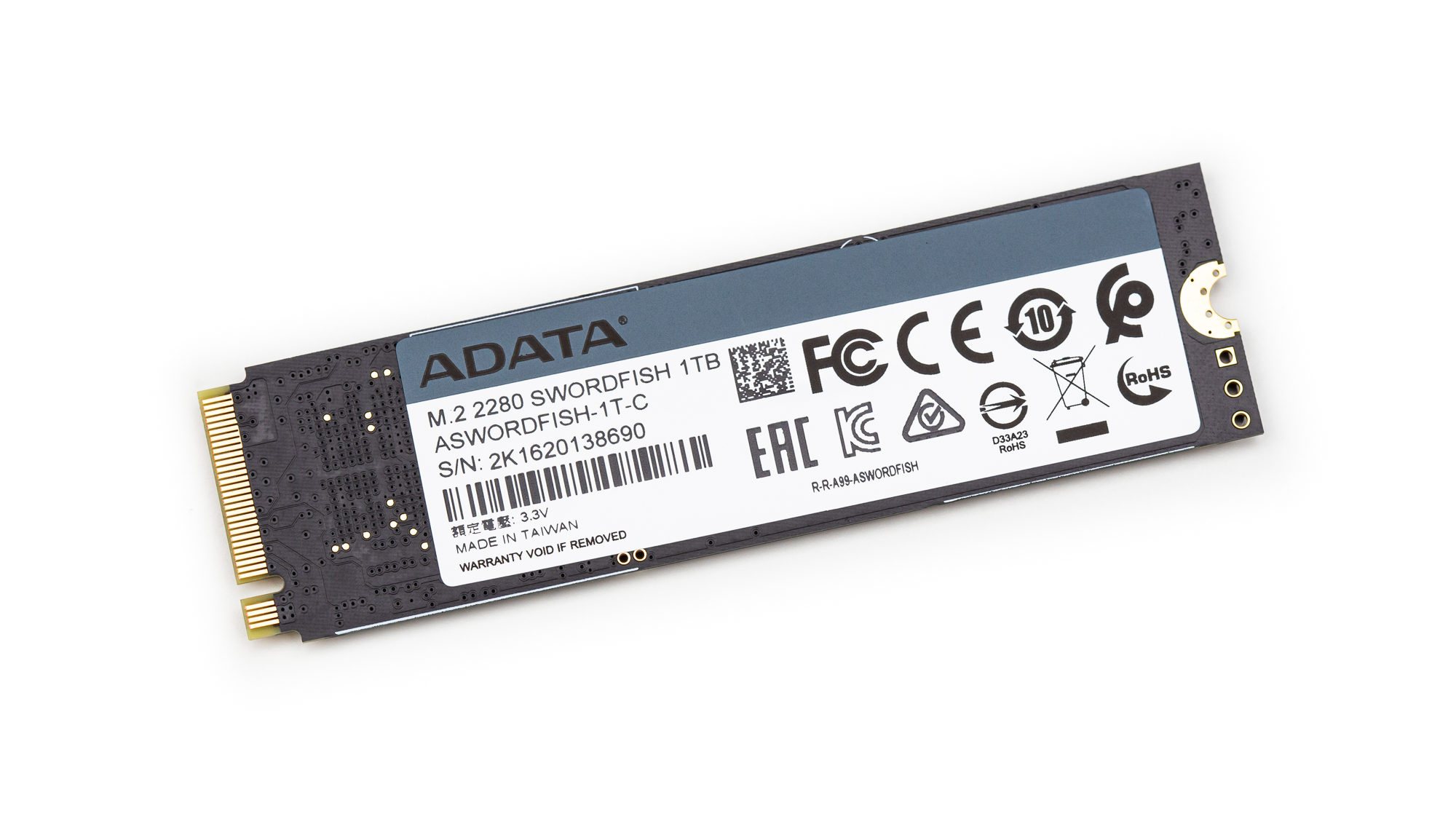
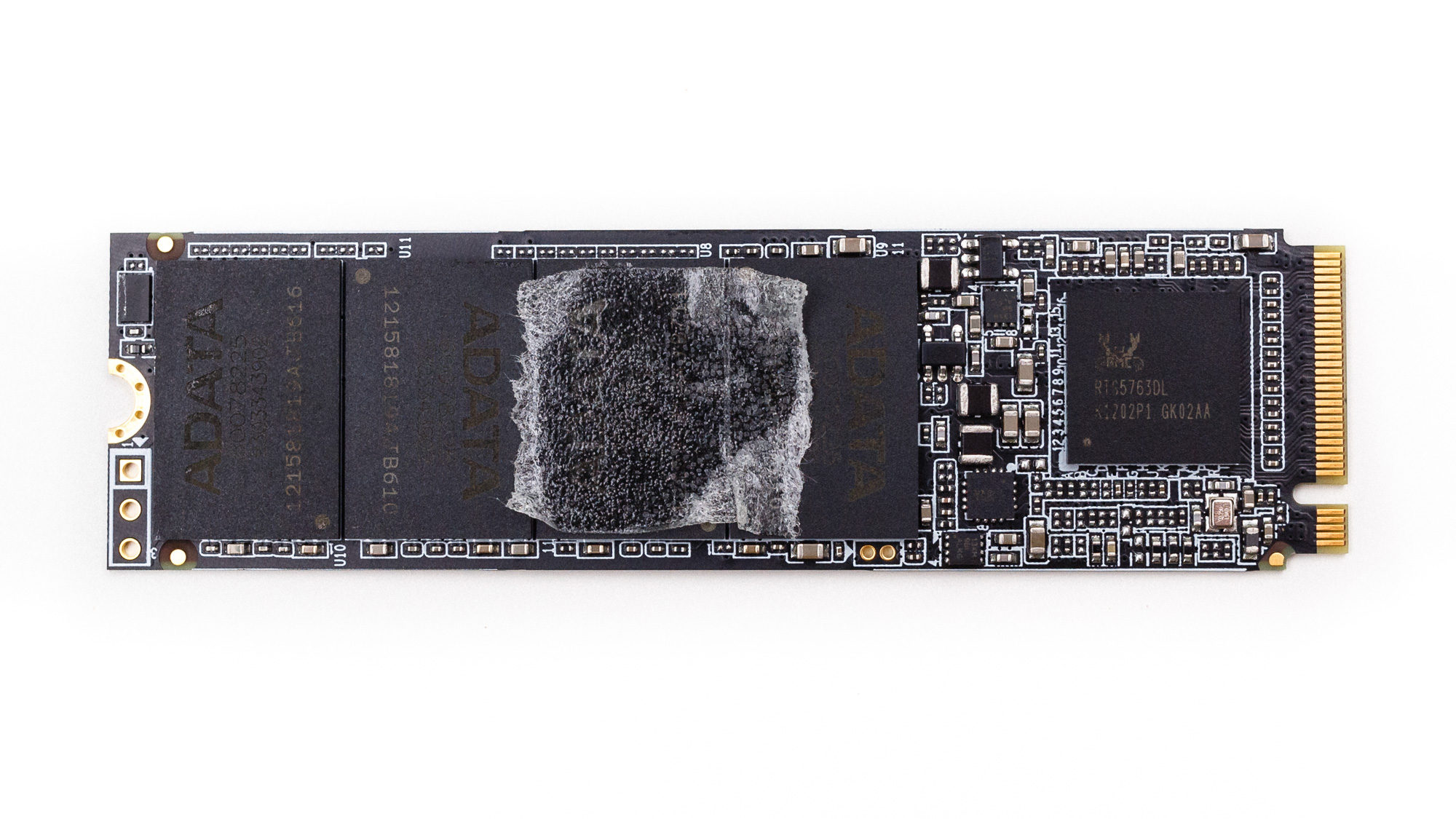
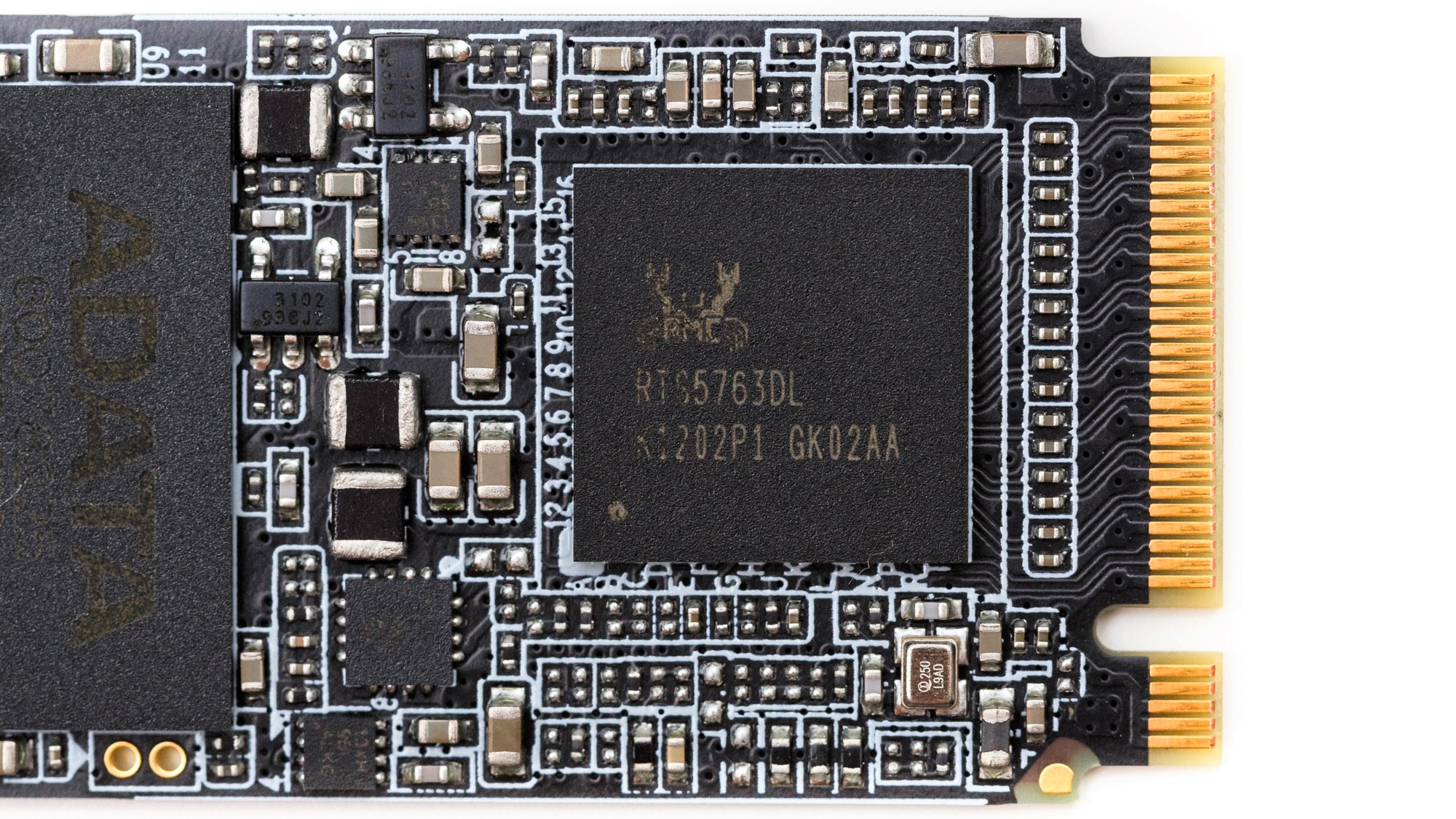
Adata’s Swordfish is an M.2 2280 form factor drive that comes with an elegantly etched aluminum heatsink which helps cool the components underneath. The 1TB and smaller capacities come in a single-sided form factor, but the 2TB comes in a double-sided form factor, meaning it’s a bit thicker. The PCB is also blacked out, which is always a plus for gamers and those who want their desktop builds to look good.
At the heart of the Swordfish is Realtek’s dual-core Arm-based RTS5763DL NVMe 1.3 SSD controller. It is designed for low cost and because of that isn’t going to be a performance leader by a long shot. While it leverages a PCIe 3.0 x4 interface, it doesn’t have the horsepower to use up all the bandwidth afforded to it. There are only four NAND flash channels and it lacks a DRAM cache for buffering the FTL mapping data, which makes it less responsive than most DRAM-based SSDs. It instead leverages HMB, which allows the SSD to utilize a few MB of the host system’s DRAM, 64MB in the Swordfish’s case, to use as FTL caching space.
Adata’s 1TB Swordfish comes with four NAND packages full of SanDisk’s 96L BiCS4 TLC NAND flash, basically the same flash as Kioxia’s 96L TLC. Each NAND package contains four dies that are 512Gb in density, 16 total. These are 2-plane dies, meaning two regions of the NAND flash die can be accessed individually for improved performance, although designs from Micron and SK Hynix feature quad-plane access per die. The flash interfaces with the controller at an I/O rate of roughly 667-800 MTps at 1.2V.

Sean is a Contributing Editor at Tom’s Hardware US, covering storage hardware.
-
kep55 I really wonder at times if all gosh & gee whiz Tom's throws out on devices that are fractional seconds faster matters in the real world. Have any of these new & improved devices ever been tested by average Joes and not the "Let's get the highest score in Call of Duty" crowd. I noticed a definite speed increase when I went from 32-bit OS to 64-bit OS, but when I installed a SSD drive as my boot drive nothing perceptively changed. Until the SSD crashed & lost everything and absolutely NOTHING could recover the data. Thank goodness for AOMEI Backupper & WD MyCloud.Reply -
mdd1963 Replykep55 said:but when I installed a SSD drive as my boot drive nothing perceptively changed. Until the SSD crashed & lost everything and absolutely NOTHING could recover the data. Thank goodness for AOMEI Backupper & WD MyCloud.
You had 4-5 second boot times with a spinning drive, and the same boot times after an upgrade to an SSD? Or you had 30 second boots, and same boot times after upgrade?
(The SSD is normally a 'night and day' difference compared to a spinning drive...) -
kep55 Boot time was the same. Loading applications the same. Losing everything due to a drive crash NOT the same.Reply -
seanwebster Reply
That sounds strange. Sorry to hear about the bad experience. Everyone I upgrade noticed a difference between a SSD and HDD for everything. I even notice big responsiveness differences between even SATA and NVMe, personally. What drive/system was it? Good thing you’re smart and have backups in place!kep55 said:Boot time was the same. Loading applications the same. Losing everything due to a drive crash NOT the same.
Sometimes people clone and forget to remove their old drives and continue to use their HDD without noticing.